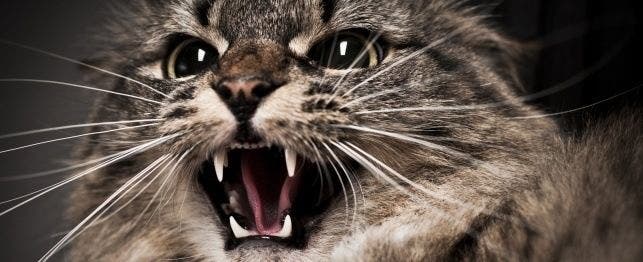
Why Do Cats Hiss?
An angry cat can be quite intimidating. Your usually cool cat suddenly crouches, half opens his mouth, draws back his lips, and bares his teeth in a terrifying expression. And then he expels his breath in a loud hiss. It’s enough to deter anyone – or anything.
But that’s the whole point. And what could be more intimidating than sounding like one of the world’s most fearsome animals – the snake. The sound your cat makes – as well as its grimace – resembles that of a snake right before it strikes. And the message is clear: This is a warning, and any further threatening behavior toward me is at your peril.
When your cat hisses, it is a defensive act; in fact, it’s an evolutionary strategy of deception based on mimicry, and occurs when one species of animal looks like or behaves like another one. Mimicry is fairly common in the animal kingdom. For example, when burrowing owls are cornered, they produce a defensive hiss that mimics the rattle of a rattlesnake. Non-poisonous viceroy butterflies mimic the poisonous monarch butterfly in color, and as a result birds do not to eat them. And a beetle called the “locust borer” mimics the sound of a bee when picked up.
When your cat hisses at another cat, don’t be too eager to intervene. Not only is hissing a defensive strategy; it is also a manner of communicating to establish house rules. A kitten may playfully pounce on an older cat, who will then hiss. Usually the kitten gets the point – that this older cat is not to be messed with.
Your cat may also display this threatening behavior toward you. When your kitty hisses at you, it’s best to ignore the behavior and walk away. Your pet will soon learn that this verbal display will get him no attention at all and should be saved for really threatening circumstances – not just silly old you.